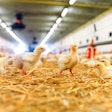
Wayne-Sanderson Farms recently added gender sorting capabilities to its Dobson, North Carolina hatchery as a part of a $13 million expansion project.
The operational decision allows the 25,000 square foot hatchery to send females to support south Alabama small-bird operations and males to area farms to support Dobson production.
The facility expansion will also help improve the work environment for team members, according to the press release.
“Since we were going to gender identification and sorting here, we needed more space, so it only made sense to improve the work environment for our people at the same time” explained Dobson Complex Manager Matthew Wooten.
The Dobson hatchery produces 831,00 eggs per week, employing 37 workers.
“We decided to expand the hatchery by converting the existing office and workspace over to hatchery operations and then build out new workspace including offices, restrooms, breakroom, and kitchen,” added Wooten.
In 2019, Wayne Farms purchased a 125-acre parcel of land adjacent to the feed mill and hatchery in Dobson. Because of its proximity to the existing feed mill in Dobson, and the addition of broiler farms in the area, “it made a lot of sense,” to make the land purchase
Wayne-Sanderson Farm merger
Wayne-Sanderson Farms formed in July 2022 following the acquisition of Sanderson Farms by Cargill and Continental Grain Company. Clint Rivers, currently CEO of Wayne Farms, has been appointed CEO of the combined company.
Rivers said: “I am honored to lead the new Wayne-Sanderson Farms, which brings together a talented team with complementary operations and cultures and a strong commitment to employees, farmers and the communities where we operate. The new company is ideally positioned to continue to serve customers and consumers with high-quality and affordable products.”
According to the WATTPoultry.com Top Companies Database, Sanderson Farms is the third largest poultry company in the United States, while Wayne Farms is the seventh. Sanderson Farms produced 94.31 million pounds of ready-to-cook chicken on a weekly basis, while Wayne Farms produced 48.8 million pounds weekly.


















